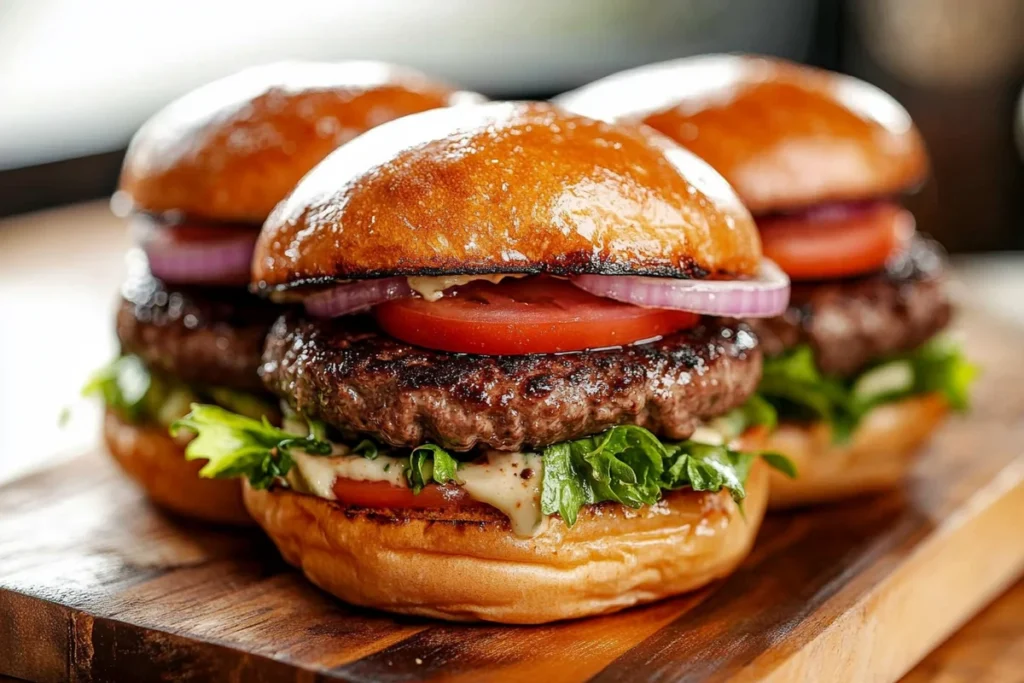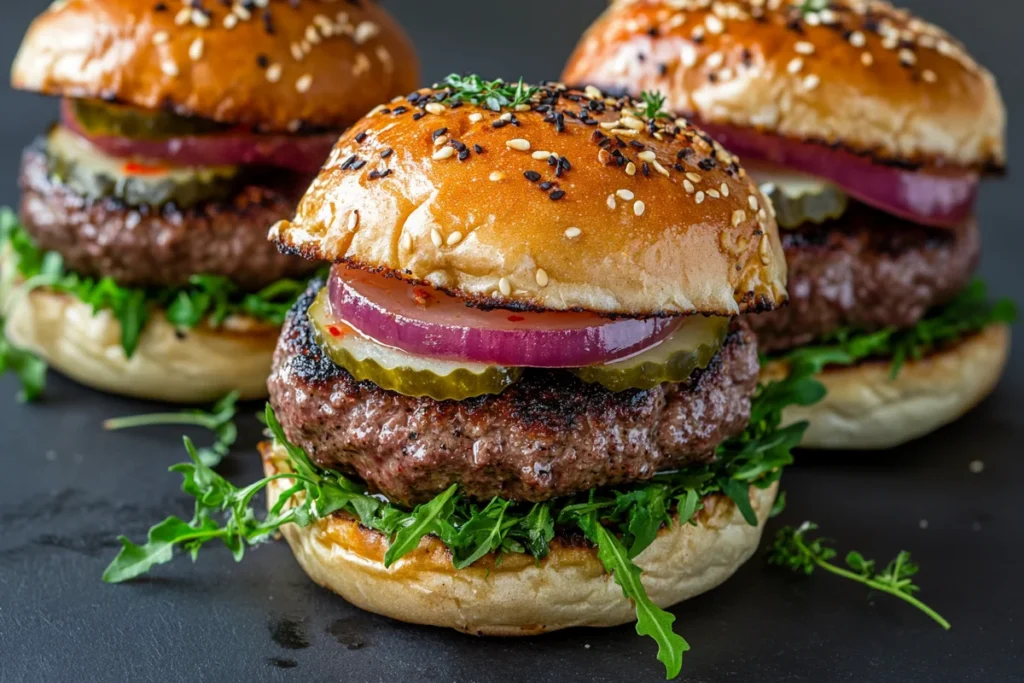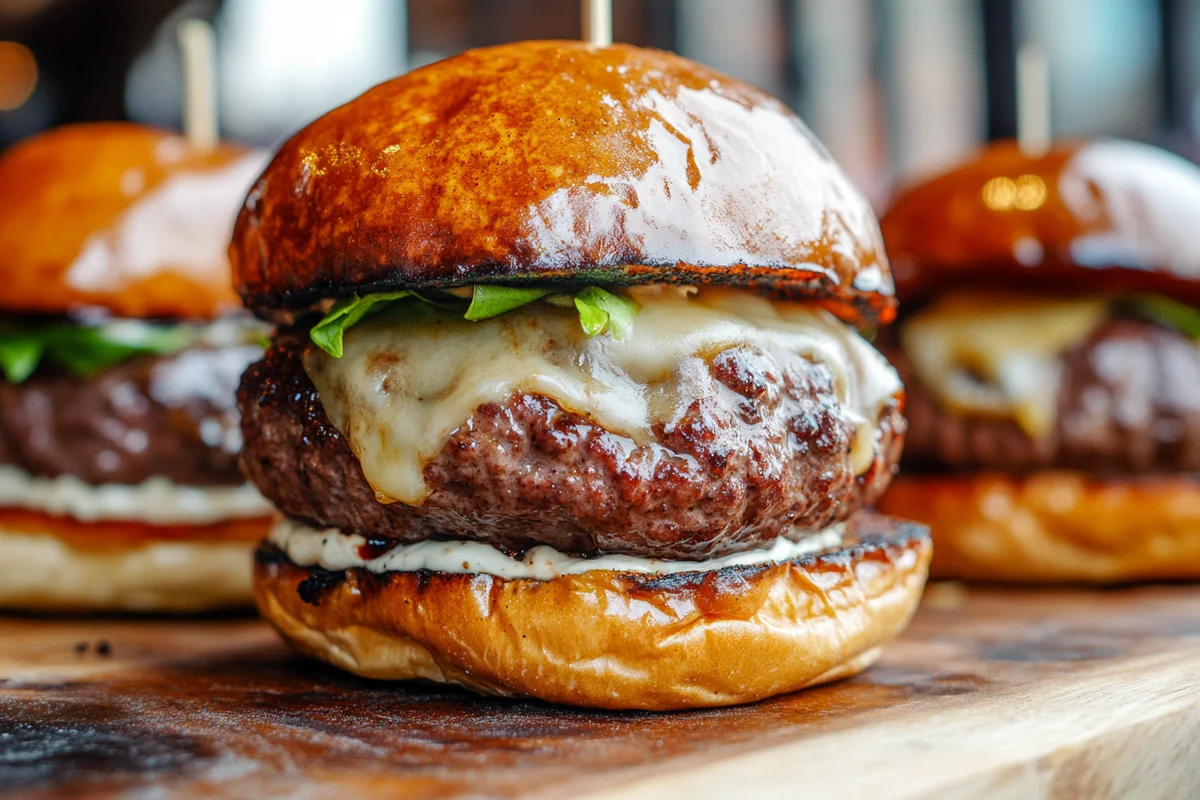Wagyu beef has earned a reputation as a premium product in the culinary world, and now it’s making waves in the burger industry. Its rich marbling, buttery flavor, and tender texture are unlike any other beef variety. But is Wagyu beef good for burgers, or is it an overhyped luxury that doesn’t quite fit the classic burger mold? In this article, we’ll examine whether Wagyu beef is the right choice for your next burger, examining everything from its unique qualities to the best ways to cook it.
What is Wagyu Beef?
Before diving into the specifics of burgers, it’s essential to understand what makes Wagyu beef so special. The word “Wagyu” translates directly to “Japanese cow.” However, Wagyu refers to a particular breed of cattle raised under strict conditions, resulting in meat unparalleled in tenderness and marbling.
Critical Characteristics of Wagyu Beef
- Intense Marbling: The fat is dispersed throughout the muscle, creating a high degree of marbling that gives Wagyu its signature buttery texture.
- Rich Flavor: Due to the marbling, the beef is tender, juicy, and rich, creating a taste that is distinctive and luxurious.
- High-Fat Content: Wagyu has significantly more fat than standard beef, which contributes to its flavor but can also influence how it cooks.
These qualities make Wagyu stand out, but do they translate well into burger form?
Japanese Wagyu vs. American Wagyu
It’s also important to note the differences between Japanese and American Wagyu. Japanese Wagyu is the purebred variety known for its extraordinary marbling and high price. On the other hand, American Wagyu is a crossbreed between Japanese Wagyu and American Angus. While American Wagyu still boasts excellent marbling and flavor, it’s not quite as decadent as its Japanese counterpart. However, it’s more readily available and slightly more affordable.
- Japanese Wagyu: Purebred, with the highest level of marbling and cost.
- American Wagyu: Crossbred, less expensive, but still offers significant marbling and flavor.
Both types of Wagyu bring something unique to the table, but are they the right fit for a burger?
What Makes a Good Burger Patty?
To understand if Wagyu beef is ideal for burgers, we must first define what makes a great burger patty. Most burger lovers agree that a good burger patty should have the following qualities:

- Fat-to-Lean Ratio: Ideally, a burger patty should have a fat content of around 20%. This ratio ensures the patty stays juicy while cooking, creating the best texture and flavor.
- Texture: The grind of the beef should be coarse enough to provide some chew but delicate enough to maintain a consistent texture throughout the patty.
- Flavor: The flavor of the beef should be robust enough to stand out, even when combined with condiments and toppings.
Regular ground beef, like chuck, typically offers a good balance of fat and lean meat, which gives the burger a satisfying bite and flavor. But how does Wagyu beef compare in these areas?
Does Wagyu Beef Make a Good Burger?
Now we get to the heart: Is Wagyu beef good for burgers? To answer this question, we need to weigh the pros and cons of using this high-end beef for a classic burger.
Pros of Using Wagyu Beef for Burgers
- Flavor: The marbling in Wagyu beef delivers a vibrant, buttery taste that you won’t find in regular ground beef. The fat melts into the meat during cooking, creating a juicy, tender burger.
- Tenderness: Wagyu burgers are more tender than traditional beef burgers because of the fat content, giving you that “melt-in-your-mouth” experience.
- Juiciness: Due to the high-fat content, Wagyu burgers stay moist, even if cooked beyond medium. This juiciness makes for an indulgent bite every time.
Cons of Using Wagyu Beef for Burgers
- Price: Wagyu beef is significantly more expensive than regular ground beef. For example, Japanese A5 Wagyu can cost up to $100 per pound, which may be hard to justify for a simple burger.
- High-Fat Content: While the fat adds flavor, it can also be a downside. The excess fat can lead to flare-ups on the grill, making it more challenging to cook a Wagyu burger evenly. Additionally, the richness of the fat might be overwhelming for some, especially in large portions.
Comparison with Traditional Beef
Wagyu brings a more luxurious flavor profile to burgers than regular beef like Chuck or Angus. While standard beef burgers have a hearty, beefy flavor, Wagyu offers a unique depth of richness that elevates the entire burger experience. However, the extra richness might be too much for some, especially if you’re looking for a more straightforward, everyday burger.
Nutritional Aspects of Wagyu Beef
One of the questions that often comes up when discussing Wagyu burgers is the nutritional impact. Is Wagyu beef healthy, or does its high-fat content negate any benefits? Here’s a breakdown of the dietary aspects of Wagyu beef:
High-Fat Content
Wagyu beef contains more fat than regular beef, but it’s important to note that not all fat is bad. The fat in Wagyu is primarily monounsaturated fat, considered a healthier type of fat that can help reduce LDL (bad cholesterol) levels and improve overall heart health. However, the high-fat content also means Wagyu beef is more calorie-dense than traditional ground beef.
Omega-3 and Omega-6 Fatty Acids
Wagyu beef is also rich in Omega-3 and Omega-6 fatty acids, known for their anti-inflammatory properties and benefits to cardiovascular health. This makes Wagyu a better nutritional choice than some other types of beef.
Is Wagyu Healthier Than Regular Beef?
While Wagyu beef contains more fat than regular beef, much of it is good—monounsaturated fats and essential fatty acids like Omega-3s. However, its calorie-dense nature means that portion control is critical while it’s healthier in terms of fat quality.
How to Cook a Wagyu Beef Burger
Cooking Wagyu beef requires a different approach than regular beef due to its fat content. Here’s how to get the best out of your Wagyu burger:

Grilling Wagyu Burgers
- Use medium to low heat. Wagyu’s fat content can cause flare-ups, so grilling at a lower temperature can help avoid this.
- Grill for 3-4 minutes per side for a medium-rare burger.
- Let the burgers rest for 2-3 minutes before serving to allow the juices to redistribute.
Pan-Searing Wagyu Burgers
- Heat a cast-iron skillet over medium heat.
- Cook the patty for 3 minutes per side.
- Use minimal seasoning, as the Wagyu’s flavor is rich enough.
Sous-Vide Method for Wagyu Burgers
Sous-vide cooking allows for precise temperature control, ensuring your Wagyu burger is cooked evenly without losing its juiciness.
- Set the sous-vide to 135°F (57°C) for medium-rare.
- Finish the burger by searing it in a hot pan for a crisp exterior.
Resting the Burger
No matter how you cook your Wagyu burger, it’s essential to rest for a few minutes before serving. This step ensures the juices stay in the burger, keeping it moist and flavorful.
The Flavor Profile of Wagyu Beef in Burgers
Wagyu’s flavor profile is its most significant selling point. Wagyu beef is rich, buttery, and incredibly tender thanks to its intense marbling. When used in a burger, the fat melts into the meat, creating a juicy and flavorful patty.
Is Wagyu Too Rich for a Burger?
While the richness of Wagyu is what makes it stand out, it can sometimes be overwhelming in a burger, mainly if you’re used to leaner cuts of beef. To balance the richness, consider pairing Wagyu burgers with:
- Simple condiments: Stick to basic sauces like ketchup or mustard to avoid overpowering the beef’s flavor.
- Mild cheese: A slice of Swiss or cheddar can complement the richness without overwhelming it.
- Soft buns: A potato or brioche bun works well with Wagyu’s tender texture, offering a soft bite that doesn’t compete with the beef.
Is Wagyu Beef Worth the Price for Burgers?
The price is among the most significant factors when considering Wagyu beef for burgers. Wagyu is significantly more expensive than regular ground beef, so is it worth the splurge?
Cost Comparison
- Regular Ground Beef: Approximately $4-8 per pound.
- American Wagyu Beef: Ranges from $15-25 per pound.
- Japanese Wagyu Beef: Can cost upwards of $100 per pound.
While Wagyu burgers are undeniably delicious, their higher price point makes them more suited for special occasions than everyday meals.
Is the Quality Worth It?
If you’re looking to impress guests or treat yourself to a luxurious burger, Wagyu is worth the price. Its flavor and tenderness are unmatched by any other beef, and the experience justifies the cost for some. However, regular ground beef may be a better, more cost-effective option if you prefer a more straightforward, hearty burger.
Wagyu Burgers in Restaurants: A Growing
Wagyu burgers have become increasingly popular in gourmet restaurants, with many establishments offering them as a high-end twist on the classic burger.
Why Wagyu Burgers are Popular in Restaurants
- Gourmet Appeal: Wagyu’s luxurious flavor and texture make it a hit in upscale restaurants.
- Consumer Curiosity: Demand for Wagyu has increased as more people become familiar with Wagyu burgers.
- Unique Experience: Diners are willing to pay a premium to try something as unique as a Wagyu burger.
FAQs
Is Wagyu Beef Better Than Angus for Burgers?
Wagyu beef is generally more tender and flavorful than Angus due to its high marbling. However, Angus is still an excellent choice for a classic burger, offering a more traditional beefy flavor.
How Fatty is Wagyu Beef Compared to Regular Beef?
Wagyu beef has significantly more marbling and fat than regular beef, which gives it its signature buttery flavor. The fat content in Wagyu can be as much as 30-35% higher than in standard ground beef.
Can You Cook Wagyu Beef Like Regular Ground Beef?
Due to its fat content, Wagyu requires more delicate cooking than regular ground beef. Cooking at lower temperatures and shorter durations ensures the fat melts evenly and enhances the flavor without overwhelming the burger.
Does Wagyu Beef Taste Different from Normal Beef in Burgers?
Wagyu beef has a richer, more buttery flavor than standard beef. Its high-fat content creates a juicier, more tender burger with a melt-in-your-mouth texture.

